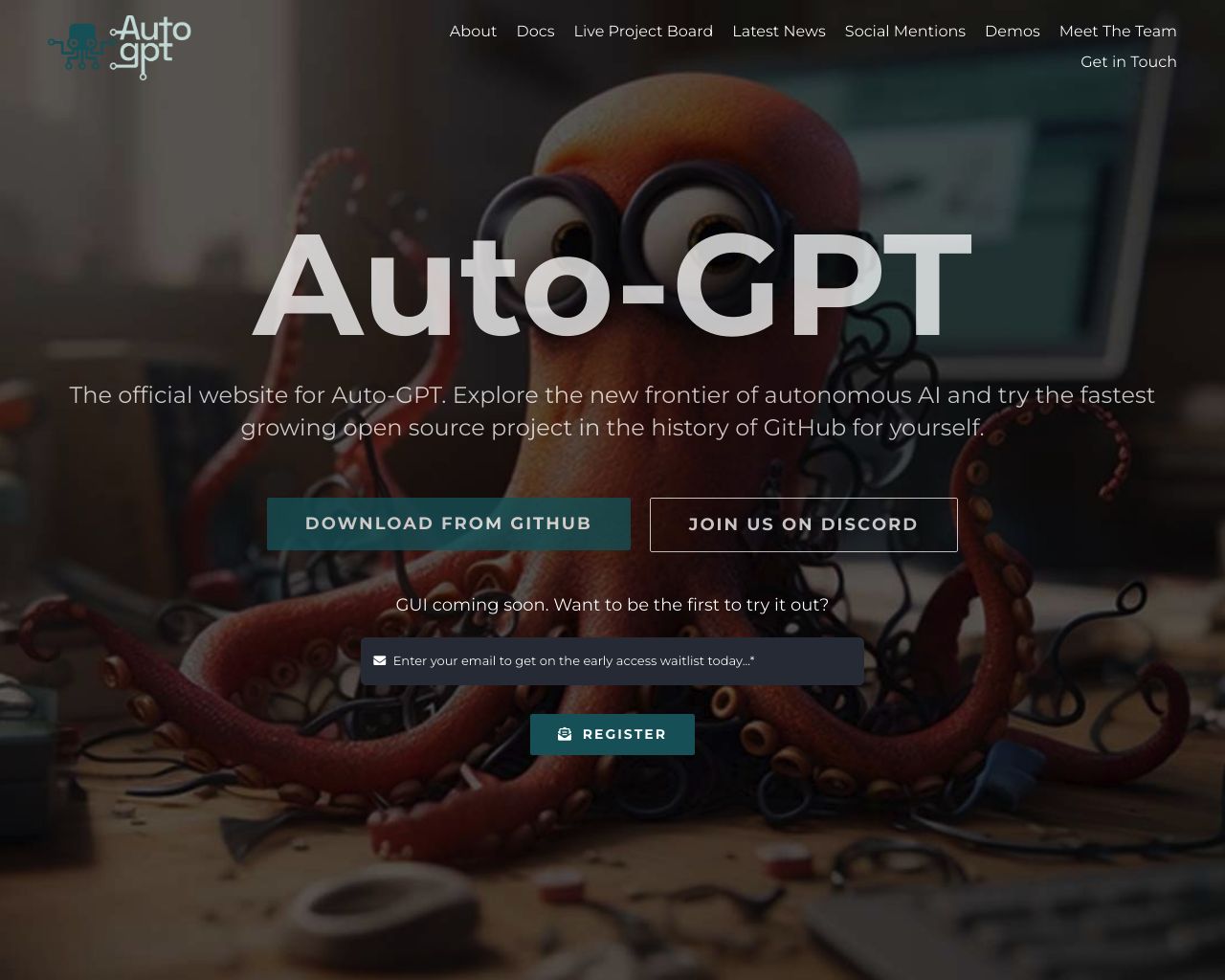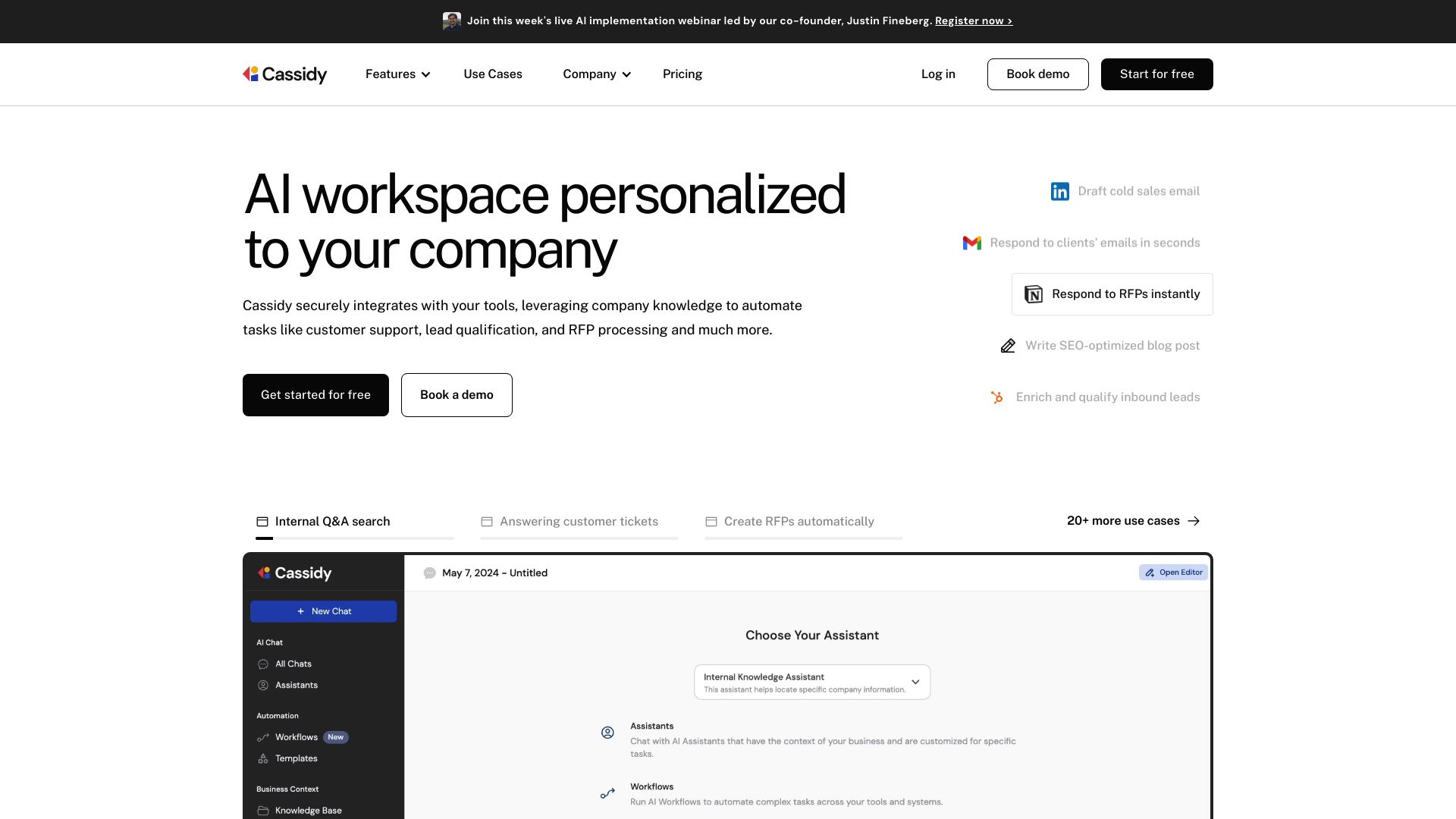AutoGPT vs. Cassidy: Comparing AI Agent Platforms
AI agents herald a new era of automation and efficiency, with platforms like AutoGPT vs. Cassidy, and SmythOS at the forefront. These tools empower users to create sophisticated AI workflows, from autonomous task execution to tailored business automations. Our comprehensive comparison delves into the strengths and limitations of each platform, exploring their unique features, integration capabilities, and security measures.
Whether you’re a developer seeking powerful APIs, a business leader focused on scalability, or an AI enthusiast eager to experiment, this analysis will guide you through the landscape of AI agent builders. Discover how these platforms stack up in terms of usability, versatility, and real-world applications, and learn which solution best aligns with your specific needs and technical expertise.
AutoGPT Overview
AutoGPT revolutionizes AI development with its open-source platform for creating autonomous AI agents. These agents leverage GPT-4 or GPT-3.5 to tackle complex tasks independently, breaking them into manageable sub-tasks and executing them without constant human oversight.


AutoGPT’s visual builder empowers users to construct AI agents through a drag-and-drop interface, eliminating the need for extensive coding knowledge. This intuitive approach democratizes AI development, making it accessible to a broader audience of developers, businesses, and researchers.
AutoGPT’s visual builder empowers users to construct AI agents through a drag-and-drop interface, eliminating the need for extensive coding knowledge.
The platform excels in autonomous decision-making, allowing agents to self-prompt and adapt to new information. AutoGPT maintains short-term memory for contextual understanding, enabling more coherent and relevant responses across interactions. Its multimodal capabilities support both text and image inputs, expanding the range of potential applications.
While AutoGPT offers impressive features, it faces challenges such as potential errors from self-feedback loops and the absence of long-term memory. The platform’s recursive nature can lead to high operational costs, and users should be aware of its tendency to occasionally produce hallucinations or get stuck in infinite loops.
AutoGPT integrates seamlessly with various tools through REST API support and custom plugins. It offers deployment options via Docker, enhancing scalability for growing projects. The platform’s debug mode and logging capabilities aid in troubleshooting and refining agent performance.
In the competitive landscape of AI development tools, AutoGPT stands out for its focus on autonomous agents and open-source nature. It represents a significant step towards artificial general intelligence, attracting attention from the tech community and investors alike. However, users should carefully consider their specific needs and the platform’s limitations when evaluating it against other AI agent builders.
Cassidy Overview
Cassidy delivers a powerful platform for creating custom AI automations and assistants tailored to specific business needs. The software integrates seamlessly with existing tools, leveraging company knowledge to automate tasks like customer support, lead qualification, and RFP processing.


Cassidy’s model-agnostic approach allows businesses to use any foundational AI model, future-proofing their AI strategies. The platform boasts robust integration capabilities, connecting with data sources such as Google Drive, Slack, and Notion. Enterprise-grade security measures ensure data confidentiality by never using client information for model training.
Cassidy’s model-agnostic approach allows businesses to use any foundational AI model, future-proofing their AI strategies.
A standout feature of Cassidy is its user-friendly workflow builder. This no-code, drag-and-drop interface empowers users to construct complex AI automations without extensive programming knowledge. Additionally, Cassidy offers browser extensions that bring AI capabilities directly into web applications like LinkedIn and email clients, enhancing productivity across various digital platforms.
A standout feature of Cassidy is its user-friendly workflow builder… empowers users to construct complex AI automations without extensive programming knowledge.
While Cassidy excels in customization and integration, it may face challenges in scalability for larger enterprises. The platform’s focus on business-specific solutions might limit its appeal for users seeking more generalized AI development tools. Despite these potential drawbacks, Cassidy’s vision of making AI accessible to non-technical users positions it as a valuable tool for businesses looking to harness AI for enhanced productivity and operational efficiency.
Feature Comparison
AutoGPT and Cassidy offer distinct approaches to AI agent development. AutoGPT excels in autonomous task execution, leveraging GPT-4 or GPT-3.5 to break down complex goals into manageable subtasks. Its self-prompting capability allows agents to adapt and make decisions without constant human input. Cassidy, on the other hand, focuses on business-specific AI automations, providing a model-agnostic platform that integrates seamlessly with existing tools and company knowledge bases.
In terms of core components, AutoGPT’s strength lies in its ability to maintain short-term memory for contextual understanding, enabling more coherent interactions. However, it lacks long-term memory capabilities, which can limit its performance in extended tasks. Cassidy addresses this gap by leveraging company knowledge bases, allowing for more informed and context-aware automations over time. AutoGPT’s multimodal support for text and image inputs expands its application range, while Cassidy’s integration with various data sources like Google Drive and Slack enhances its utility in business environments.
Security features highlight significant differences between the two platforms. Cassidy emphasizes enterprise-grade security, ensuring data confidentiality by never using client information for model training. AutoGPT, being open-source, may require additional security measures when handling sensitive data. While both platforms support API integrations, Cassidy’s focus on connecting with business tools and data sources provides a more comprehensive solution for enterprise users seeking to automate workflows and enhance productivity across digital platforms.
Feature Comparison Table
| AutoGPT | Cassidy | SmythOS | |
|---|---|---|---|
| CORE FEATURES | |||
| Hosted Agents (Dev, Production) | ❌ | ✅ | ✅ |
| Autonomous Agents | ✅ | ❌ | ✅ |
| Explainability & Transparency | ❌ | ❌ | ✅ |
| Multimodal | ✅ | ❌ | ✅ |
| Multi-Agent Collaboration | ✅ | ❌ | ✅ |
| Audit Logs for Analytics | ❌ | ❌ | ✅ |
| Agent Work Scheduler | ❌ | ✅ | ✅ |
| SECURITY | |||
| Constrained Alignment | ❌ | ✅ | ✅ |
| IP Control | ❌ | ❌ | ✅ |
| COMPONENTS | |||
| Huggingface AIs | ✅ | ❌ | ✅ |
| Classifiers | ✅ | ❌ | ✅ |
| Data Lakes | ❌ | ❌ | ✅ |
| DEPLOYMENT OPTIONS (EMBODIMENTS) | |||
| Staging Domains | ❌ | ❌ | ✅ |
| Production Domains | ❌ | ❌ | ✅ |
| API Authentication (OAuth + Key) | ✅ | ❌ | ✅ |
| Deploy as Site Chat | ✅ | ❌ | ✅ |
| Deploy as Scheduled Agent | ❌ | ✅ | ✅ |
| Deploy as GPT | ✅ | ❌ | ✅ |
| DATA LAKE SUPPORT | |||
| Hosted Vector Database | ❌ | ❌ | ✅ |
| Sitemap Crawler | ❌ | ❌ | ✅ |
| YouTube Transcript Crawler | ❌ | ❌ | ✅ |
| URL Crawler | ✅ | ❌ | ✅ |
Best Alternative to AutoGPT and Cassidy
SmythOS stands out as the superior agentic AI automation platform compared to AutoGPT and Cassidy. Our platform offers unparalleled versatility and ease of use, empowering users to create sophisticated AI agents without extensive coding knowledge. SmythOS’ drag-and-drop interface and pre-built components streamline the development process, making AI accessible to a broader audience while maintaining powerful capabilities for experienced developers.
SmythOS stands out as the superior agentic AI automation platform compared to AutoGPT and Cassidy. Our platform offers unparalleled versatility and ease of use…
Unlike AutoGPT’s limited long-term memory and Cassidy’s focus on business-specific automations, SmythOS provides a comprehensive solution with both short-term and long-term memory capabilities. This enables our agents to maintain context and learn from past interactions, resulting in more intelligent and adaptive AI solutions. Additionally, our platform supports multimodal inputs, including text, images, and more, expanding the range of potential applications beyond what AutoGPT and Cassidy offer.
Security and scalability set SmythOS apart from competitors. We prioritize enterprise-grade security measures, including data encryption and OAuth authentication, ensuring your sensitive information remains protected. Our platform’s scalability allows seamless growth from small projects to large-scale enterprise deployments, adapting to your changing needs without compromising performance.
SmythOS excels in its extensive integration capabilities, connecting with a wide array of APIs, AI models, and tools. This flexibility allows users to leverage existing systems and data sources, creating AI solutions that seamlessly fit into their workflows. Whether you’re deploying agents as APIs, chatbots, or scheduled tasks, SmythOS provides the versatility to meet diverse use cases that AutoGPT and Cassidy may struggle to address.
SmythOS excels in its extensive integration capabilities, connecting with a wide array of APIs, AI models, and tools.
By choosing SmythOS, you’re not just selecting an AI platform – you’re embracing a future-proof solution that continually evolves to meet the changing landscape of AI technology. Our commitment to innovation, user-friendly design, and powerful features makes SmythOS the clear choice for those seeking to harness the full potential of AI agents in their projects and businesses.
Conclusion
AutoGPT, Cassidy, and SmythOS each offer unique approaches to AI agent development, catering to different needs and skill levels. AutoGPT excels in autonomous task execution, breaking complex goals into manageable subtasks without constant human input. Cassidy focuses on business-specific AI automations, integrating seamlessly with existing tools and leveraging company knowledge bases. However, SmythOS emerges as the superior choice, combining the strengths of both while addressing their limitations.
SmythOS stands out with its user-friendly drag-and-drop interface, extensive integration capabilities, and versatile deployment options. Unlike AutoGPT’s potential for errors in self-feedback loops or Cassidy’s limitations in scalability, SmythOS offers a robust platform suitable for businesses of all sizes. Our enterprise-grade security measures, support for multiple AI models, and ability to deploy agents across various platforms make SmythOS the ideal solution for companies seeking to harness AI’s full potential.
While AutoGPT and Cassidy have their merits, SmythOS provides a more comprehensive and accessible approach to AI agent development. Our platform empowers users to create complex AI workflows without extensive coding knowledge, supports multi-agent collaboration, and offers unparalleled flexibility in deployment. Whether you’re a developer, business leader, or AI enthusiast, SmythOS provides the tools and capabilities to revolutionize your AI initiatives.
Ready to experience the future of AI agent development? Explore our diverse range of AI-powered agent templates to jumpstart your projects, or create a free SmythOS account to build and deploy your own AI agents today. With our 30-day money-back guarantee and unlimited free agent creation, there’s no risk in discovering how SmythOS can transform your business processes and drive innovation.
Last updated:
Disclaimer: The information presented in this article is for general informational purposes only and is provided as is. While we strive to keep the content up-to-date and accurate, we make no representations or warranties of any kind, express or implied, about the completeness, accuracy, reliability, suitability, or availability of the information contained in this article.
Any reliance you place on such information is strictly at your own risk. We reserve the right to make additions, deletions, or modifications to the contents of this article at any time without prior notice.
In no event will we be liable for any loss or damage including without limitation, indirect or consequential loss or damage, or any loss or damage whatsoever arising from loss of data, profits, or any other loss not specified herein arising out of, or in connection with, the use of this article.
Despite our best efforts, this article may contain oversights, errors, or omissions. If you notice any inaccuracies or have concerns about the content, please report them through our content feedback form. Your input helps us maintain the quality and reliability of our information.
